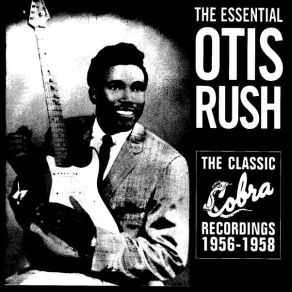The Essential Otis Rush
Download links and information about The Essential Otis Rush by Otis Rush. This album was released in 2006 and it belongs to Blues genres. It contains 24 tracks with total duration of 01:14:27 minutes.

|
|
|---|---|
| Artist: | Otis Rush |
| Release date: | 2006 |
| Genre: | Blues |
| Tracks: | 24 |
| Duration: | 01:14:27 |
| Buy it NOW at: | |
| Buy on iTunes $11.99 | |
Tracks
[Edit]| No. | Title | Length |
|---|---|---|
| 1. | I Can't Quit You Baby | 3:07 |
| 2. | Sit Down Baby | 2:20 |
| 3. | Violent Love | 2:25 |
| 4. | My Love Will Never Die | 3:06 |
| 5. | Groaning the Blues | 3:03 |
| 6. | If You Were Mine | 3:06 |
| 7. | Love That Woman | 3:00 |
| 8. | Jump Sister Bessie | 2:33 |
| 9. | Three Times a Fool | 2:50 |
| 10. | She's a Good 'Un | 2:49 |
| 11. | It Takes Time | 2:49 |
| 12. | Checking On My Baby | 2:56 |
| 13. | Double Trouble | 2:43 |
| 14. | Keep On Loving Me Baby | 2:20 |
| 15. | All Your Love (I Miss Loving) | 2:38 |
| 16. | My Baby Is a Good 'Un | 2:39 |
| 17. | I Can't Quit You Baby (Take 3) | 3:39 |
| 18. | Sit Down Baby | 2:20 |
| 19. | Groaning the Blues (Take 3) | 3:48 |
| 20. | My Love Will Never Die (Take Unknown) | 3:05 |
| 21. | She's a Good 'Un (Take 4) | 2:59 |
| 22. | Three Times a Fool (Take Unknown) | 3:18 |
| 23. | Double Trouble (Take 3) | 5:09 |
| 24. | Sit Down Baby (Take Unknown) | 5:45 |
Details
[Edit]Though Otis Rush only recorded eight singles for Cobra Records during his 1956-'58 tenure with the label, they became milestones in his own storied career and crucial cuts in the Chicago blues canon. "I Can't Quit You Baby" was Cobra's first-ever release, and it kicked off the label's short-but-sweet lifespan with a bang; the raw emotion Rush unleashes on the Willie Dixon–penned tune would find echoes in countless cover versions over the years. Rush's take on Dixon's swinging, jazzy "Violent Love" shows the singer/guitarist had a sharp sense of humor too. While Rush's stinging guitar solos are vital to the visceral quality of most of these tunes, it was actually Ike Turner who provided the soul-on-fire solo that makes "Double Trouble" one of the most magnificently harrowing tracks in the history of the blues. And the slinky, minor-key stroll "All Your Love (I Miss Loving)" would go on to be an inspiration to subsequent generations of rockers as well as blues players, allegedly providing the template for Peter Green's "Black Magic Woman," among others.